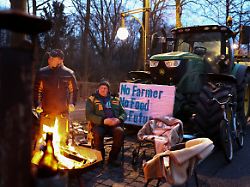Peak of the protests in Berlin
Traffic lights send farmers contradictory signals
January 14, 2024, 6:57 p.m
At the end of their week of protest, the farmers also spoke to the leaders of the traffic light coalition. They come across very different positions: the Chancellor insists on reducing subsidies, the Agriculture Minister is calling for concessions, and the Farmers’ President has already rejected an offer from the FDP leader.
Before the large farmers’ demonstration in Berlin tomorrow, Monday, the federal government defended the subsidy cuts for agriculture. Chancellor Olaf Scholz spoke of a “good compromise”, but the farmers’ associations and the Union called for the cuts to be completely reversed. In parallel to the protests, the leaders of the traffic light coalition want to speak to representatives of the farmers’ associations.
SPD leader Lars Klingbeil assured the farmers of “an open dialogue at eye level.” Because rural agriculture in Germany should have a good perspective, he emphasized in the newspapers of the Funke media group. Last week’s protests showed “that frustration has been building up in agriculture for years.”
Federal President Frank-Walter Steinmeier also advocates for a dialogue with the farmers: “Lack of speech between the federal government and the farmers harms everyone involved,” he told the “Süddeutsche Zeitung”. In the current situation, personal conversations are “urgently necessary.”
The federal government announced in mid-December that it would abolish the vehicle tax exemption for agricultural machinery and the subsidies for agricultural diesel. In view of massive protests, it reversed the end of the vehicle tax exemption at the beginning of the year and extended the abolition of agricultural diesel benefits in several steps until 2026. But this is not enough for the farmers: Since last Monday, they have been protesting against this with large rallies and the blocking of motorway entrances the cuts.
Minister of Agriculture for concessions
However, the Chancellor stuck to his course for the time being. Subsidies cannot remain in place “forever,” Scholz said in a video podcast. His government has “taken the farmers’ arguments to heart” and has therefore “revised its first proposal”. From his point of view, this is “a good compromise”.
Federal Finance Minister Christian Lindner emphasized that “everyone must make their contribution” to rehabilitate state finances. The agricultural sector receives “a good nine billion euros in subsidies every year from Brussels and Berlin,” said the FDP leader in the “Neue Osnabrücker Zeitung”. “Less than three hundred million will now be lost in 2025. So we’re talking about around three percent.”
However, in the “Rheinische Post”, Lindner promised farmers an increased reduction in bureaucratic burdens. He emphasized: “We have to look at how economic success can be improved overall through less regulation.”
Agriculture Minister Cem Özdemir, however, spoke out in favor of further concessions for farmers in the cabinet. “It is now important that we give farmers a positive perspective and planning security,” said the Green politician in the “Frankfurter Allgemeine Sonntagszeitung”. Among other things, he called for “an animal welfare tax to finance the conversion of more animal-friendly stables”.
Rejection of “lazy compromises”
Meanwhile, the farmers’ associations are sticking to their demand for a complete reversal of the subsidy cuts. Tomorrow, Monday, there will be another major rally in Berlin, to which thousands of farmers are expected. “We will not accept lazy compromises when it comes to agricultural diesel,” said farmer president Joachim Rukwied to the “Rheinische Post”. The traffic light coalition still hasn’t understood this. “Even well-intentioned suggestions for reducing bureaucracy don’t help,” he said about the Finance Minister’s proposals.
The farmers are supported by the Union. Both Bavaria’s Prime Minister Markus Söder and Union parliamentary group deputy Jens Spahn called for a complete reversal of the subsidy cuts. Söder called this on Deutschlandfunk a “one-sided, permanent attack on agriculture.”
Spahn insists on the withdrawal before a meeting between the leaders of the traffic light coalition and the farmers’ association on Monday. “This clear traffic light signal” is needed, he told the newspapers of the Germany editorial network. The CDU politician further called for an “agricultural peace agreed across party lines”.
